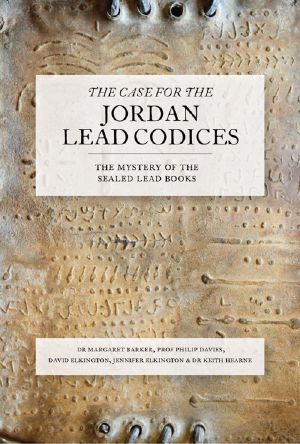The Case for the Jordan Lead Codices

- Authors
- Elkington, David
- Publisher
- Watkins Publishing
- Tags
- religion , the case for the jordan lead codices: the mystery of the sealed lead books
- ISBN
- 9781780289953
- Date
- 2014-05-20T00:00:00+00:00
- Size
- 6.66 MB
- Lang
- en
Arguably the most important religious discovery of all time, the Jordan Lead Codices are considered by many to be more significant in the history of the Christian Church than the Dead Sea Scrolls and Gnostic Gospels.
Much has been going on behind the scenes to try to prevent the publication of any related analytical material. News of the discovery of the codices was suppressed in Jordan in early 2013. Academics refused to acknowledge both the authors and their efforts to rationalize and analyze the hoard; they even prevented excavation of the cave site in which the codices were found. Furthermore, bloggers and scholars with vested interests aided this suppression by seeking to discredit the discovery.
The Case For the Jordan Lead Codices brings together the first academic papers to be written about this ancient find. In ‘Discovering the Lead Codices’ , David Elkington provides a first-hand account of the uncovering of the hoard. Following this is ‘Forgery and the Bible’ by Professor Philip Davies, who was prominent in breaking the embargo on the Dead Sea Scrolls in the early 1990s. A groundbreaking article by Dr Margaret Barker, ‘Those Codices’, places the artefacts in their proper historical and theological contexts, making the case for their authenticity as well as the necessity for further research. A specialist Chartered Engineer in the private sector underscores Barker’s argument in an extensive paper, ‘Summary of Technical Analysis of the Jordan Codices’, which points to the codices being the earliest Christian texts ever discovered. An essay by Dr Keith Hearne explores the effect of unscrupulous blogging upon the delivery of fact and context in history in ‘Encounters with the Cyber Commentariat’. And finally, in ‘A Right to Reply’, Jennifer Elkington discusses the ‘Thonemann Affair’ (in which Oxford lecturer Peter Thonemann declared that ‘the material had been faked’) within the framework of proper academic behaviour. Elkington also reveals the fact that very few individuals have had, or have asked for, access to proper samples and analyses of the codices. This is underlined by further background material describing the activities of certain players in the field.